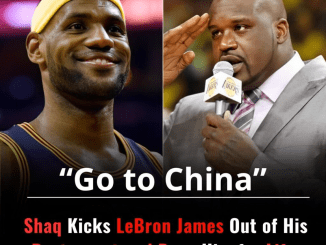In a shocking and controversial statement, Michael Jordan, widely regarded as one of the greatest basketball players of all time, has expressed his outrage over athletes protesting during the national anthem. Jordan, who has often remained out of the political spotlight, has taken a strong stance, calling for medals to be stripped from athletes who kneel in protest. The remarks have sparked intense debate among fans, fellow athletes, and political figures alike.

The Athlete’s Stance
In an interview with a prominent sports network, Jordan shared his frustration with athletes using the national anthem as a form of protest, citing that it disrespects the country’s values and the sacrifices made by military personnel. “I believe the national anthem is a symbol of everything we stand for as a country. When athletes kneel, they undermine everything that those before us have fought for,” Jordan stated. “I don’t believe they should be allowed to keep their medals if they refuse to stand during the anthem. It’s about respect.”
Jordan’s stance appears to stem from a long-standing commitment to honoring the flag and upholding traditional values. His comments come at a time when national anthem protests, first sparked by Colin Kaepernick in 2016, have remained a polarizing issue in the world of sports.
The History of National Anthem Protests
National anthem protests in sports began when former NFL quarterback Colin Kaepernick took a knee in 2016 during the national anthem to protest racial injustice and police brutality. His silent protest quickly gained attention and sparked similar actions from other athletes across various sports. While Kaepernick’s protest was intended to highlight social issues, it ignited a nationwide debate about patriotism, free speech, and the role of athletes in political movements.
Many athletes, including basketball stars and football players, have continued the practice of kneeling or raising fists during the national anthem, drawing the ire of some fans and public figures. However, others argue that the protests are a form of peaceful expression, calling attention to important social issues.
Jordan’s Comments: A Heated Response
Jordan’s comments have certainly not been met without backlash. Critics have pointed out that his remarks ignore the deeper purpose of the protests, which aim to bring attention to the systemic issues of racism and inequality in society. Former NBA players, as well as politicians, have expressed their disagreement with Jordan’s statement.
LeBron James, one of Jordan’s most high-profile contemporaries, took to social media to respond. “Athletes have the right to use their platform to speak out against injustice. We kneel not to disrespect the flag, but to call for change,” James wrote. “Michael Jordan is entitled to his opinion, but we can never stop fighting for equality.”
Fans have also weighed in on the matter, with some supporting Jordan’s traditional viewpoint, while others criticize him for overlooking the greater message of the protests. Some argue that Jordan, despite his success, may be out of touch with the younger generation of athletes and their desire to use sports as a platform for social change.
A Divisive Issue
Jordan’s stance brings the conversation about national anthem protests to the forefront once again, but this time it’s more personal. As an icon, Jordan’s words carry weight, and his condemnation of the protests could have far-reaching effects. The debate between respect for the flag and the fight for racial equality seems more intense than ever, with passionate arguments on both sides.
The future of this controversy may lie in how both fans and athletes choose to navigate this divide, with figures like Jordan sparking dialogue about tradition and the role of activism in sports. Regardless of the opinions on either side, Jordan’s statement serves as a reminder of the complexity of issues that sports figures often have to contend with when they decide to take a stand—whether for patriotism or for social justice.


